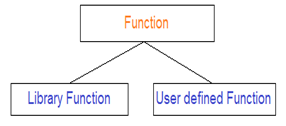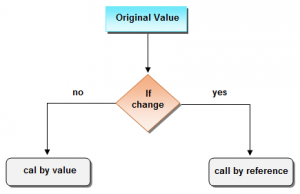Function in C
Function is a group of statements that are used to perform any task. In other words, we can say that a function is a self- contained a block of programs that perform a coherent task. Why to use function A function is used to divide a large code into modules that help us to debug and maintain the code. We can call any function multiple times. There are various advantages of function:
- Code re-usability
- Easy to debug the program
- Code optimization.

- Library Function :
- User-defined function
return typefunction name( parameter list ) {
body of the function
}
The function definition consists of a function header and a function body. There are the following parts of a function.
- Return type: A function may return a value. If we don’t want to return a value then we have to use void.
- Function name: We can define the function name.
- Parameters: We can pass the value in function at the time of calling.
- Function body: Function body is the collection of statements.
#include <stdio.h>
void sum(); // declaring a function
int a=5,b=10, c;
void sum() // defining function
{
c=a*b;
printf("Multiplication of (A*B) : %d\n", c);
}
int main()
{
sum(); // calling function
return 0;
}
Output
Multiplication of (A*B) : 50Call by value and call by Reference in C In C language, there are two ways to pass the value of data to function.
- call by value.
- call by reference.

Call by value:
We can’t change the original value at the time of passing value in the function but it can be changed for the current function only. It will not change the value of a variable inside the caller method such as main().
Let us consider an example:
Call by reference:
We can change the original value while using call by reference through pass the reference (address).
#include<stdio.h>
void abc(int id, int mob)
{
printf(" Passing value inside the abc function");
}
int main()
{
int id=101, mob=90972762;
abc(id, mob); // passing value to the function
printf("\nValue of ID: %d",id);
printf("\nValue of NAME: %d",mob);
return 0;
}
Output
Passing value inside the abc function Value of ID: 101 Value of NAME: 90972762
Let us consider an example:
#include <stdio.h>
void fun(int *n) {
printf("Adding value before inside the function=%d \n",*n);
(*n) += 10;
printf("Adding value after inside the function=%d \n", *n);
}
int main() {
int x=10;
printf("Before function call x=%d \n", x);
fun(&x);//passing reference in function
printf("After function call x=%d \n", x);
return 0;
}
Output
Before function call x=10 Adding value before inside the function=10 Adding value after inside the function=20 After function call x=20